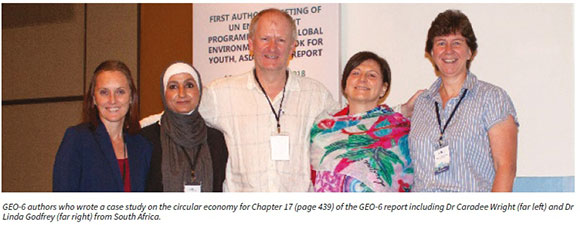Servicios Personalizados
Articulo
Indicadores
Links relacionados
-
 Citado por Google
Citado por Google -
 Similares en Google
Similares en Google
Compartir
Clean Air Journal
versión On-line ISSN 2410-972X
versión impresa ISSN 1017-1703
Clean Air J. vol.29 no.1 Pretoria 2019
http://dx.doi.org/10.17159/2410-972x/2019/v29n1a3
NEWS
Sixth Global Environmental Outlook report calls for scaling up environmental protection
Caradee Y. Wright
Environment and Health Research Unit, South African Medical Research Council and Department of Geography, Geoinformatics and Meteorology, University of Pretoria, Pretoria, South Africa Email: cwright@mrc.ac.za

On the 13 March 2019, the United Nations Environment Programme released the sixth Global Environmental Outlook (GEO-6) report in Nairobi, Kenya. After 5 years of hard work by 250 scientists from more than 70 countries, the comprehensive assessment was launched as the latest evidence on 'the environment under review'.
The theme of GEO-6 is 'Healthy Planet, Healthy People' and the report warns that 'human health is in dire straits if urgent actions are not made to protect the environment'. Water pollution, air pollution, food waste and plastic pollution in the oceans were among many of the pressing challenges identified in the report. An innovative way of thinking was proposed that shifts the current model of 'grow now, clean up after' to a 'near-zero-waste economy by 2050' model if the world is to achieve the Sustainable Development Goals.
Several South African scientists, including Caradee Wright (South African Medical Research Council), Linda Godfrey and Nadia Sitas (Council for Scientific and Industrial Research), Babatunde Abiodun (University of Cape Town), Pali Lehohla (Pan African Institute for Evidence), Rowena Hay (Umvoto), and Laura Pereira (Stellenbosch University) contributed as authors to the GEO-6 report. South Africa case studies also appear in the GEO-6 report including rhinoceros poaching as an example of overexploitation, and acid mine drainage as an impact of mining.
Writing meetings were held annually in different countries where authors gathered to pull together the evidence on five environmental themes, namely, air, biodiversity, oceans and coasts, land and soil and freshwater. Part A of the report describes the current state of the global environment by these environmental themes followed by Part B that analyses the effectiveness of policies, goals, objectives and environmental governance in relation to the same environmental themes. Part C then looks forward to what is required for a Health Planet with People and emphasizes future data and knowledge needs.
South Africa can garner important learnings from the GEO-6 report. Environmental resources and ecosystems are key to public health and we must find ways to use science, technology and finance to move along a sustainable development pathway. This requires support from communities, business and governments. Furthermore, South Africa needs to collect environmental statistics to help advance knowledge using big data and work collaboratively between public and private partners to find solutions.
The GEO-6 report is available online: www.unenvironment.org/resources/global-environment-outlook-6














